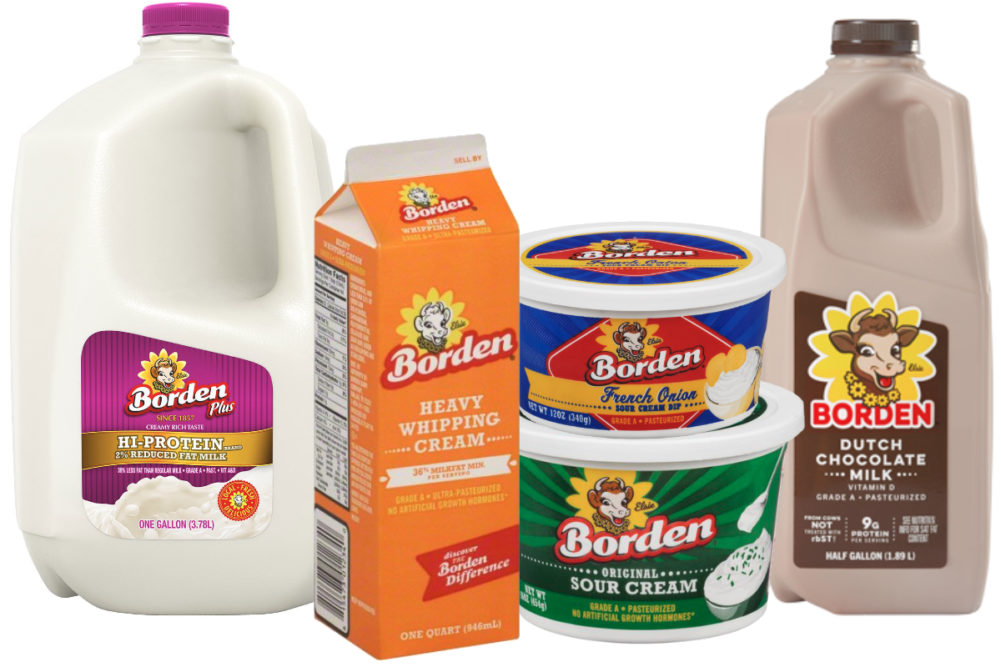DALLAS — Borden Dairy Co. filed Chapter 11 bankruptcy on Jan. 6. The company said in court documents structural changes to the retail and dairy industries led to the move. The filing comes on the heels of Dean Foods Co., the nation’s largest dairy processor, filing Chapter 11 bankruptcy this past November.
In its filing with the U.S. Bankruptcy Court for the District of Delaware, the company said net sales in 2018 were $1.19 billion with gross profit of $292 million.
“Notwithstanding the foregoing, (Borden) experienced an income loss from operations in the amount of $2.6 million and a total net income loss of $14.6 million (in 2018),” the company said. “These losses continued into 2019, with (Borden) reporting income loss from operations in the amount of $22.3 million and a total net income loss of $42.4 million from January 2019 through Dec. 7, 2019.”
Borden produces a full range of dairy products, including fluid milks, sour cream, creams and dips. Fluid milk and cream make up 92% of revenues, juices and other beverages make up 5%, ice cream 2% and cultured products 1%, according to the company. It operates 13 manufacturing plants and employs 3,300.
Management blamed the company’s predicament on the state of the U.S. beverage, retail and dairy industries.
“In recent years, dairy products have begun to compete with other replacement non-dairy nutritional products and beverages for consumer sales, which has contributed to demand decreases,” the company said. “In addition, the growth of discount grocery retailers has intensified competition and reduced the margin over milk at retail, making it increasingly difficult for Borden to hold its margin while competitively pricing its products to appeal to consumer price sensitivities. Borden competes against others that do not depend on the profitability of milk exclusively, including vertically-integrated retailers and dairy cooperatives that now process their own milk.”
The company said in the court filing that retailers such as Walmart processing some of its own milk has negated some of Borden’s marketing efforts.
“Retailers that are vertically integrated typically re-dedicate key shelf space that was formerly occupied by branded products for their own private label products,” the company said. “Accordingly, customer awareness of major food service retail establishments has decreased, which in turn has muted the marketing and sales initiatives implemented by (Borden) in the past two years.”
Adding to the milk processing industry’s woes is the fact fluid milk consumption has declined by over 100 gallons per person in North America during the past 45 years. Some of that decline is driven by the rise of plant-based dairy alternatives.
“Options like almond, soy, rice, coconut and hemp beverages are beginning to demand more and more space on grocery store shelves as consumers have grown to embrace new flavors and alternative diets,” the company said.
Borden Dairy was further pressured by the price of conventional raw milk, which has risen 27% since January 2019. Management said it expects the price of raw milk to continue to rise in 2020. The inflation comes at a time when the number of dairy producers is declining. In the past year and a half, for example, over 2,730 dairy farms have gone out of business.
“Despite our numerous achievements during the past 18 months, the company continues to be impacted by the rising cost of raw milk and market challenges facing the dairy industry,” said Tony Sarsam, chief executive officer. “These challenges have contributed to making our current level of debt unsustainable. For the last few months, we have engaged in discussions with our lenders to evaluate a range of potential strategic plans for the company. Ultimately, we determined that the best way to protect the company, for the benefit of all stakeholders, is to reorganize through this court-supervised process.”





